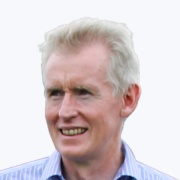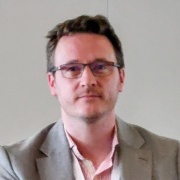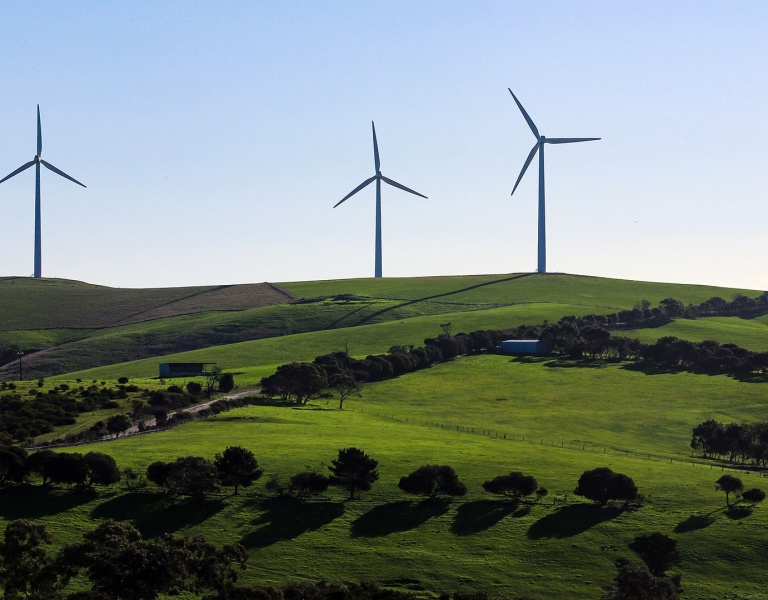Wind Technology Collaboration Programme
Since 1977, the IEA Wind TCP has developed and deployed wind energy technology through vigorous national programmes and co-operative international efforts.
The International Energy Agency Wind Technology Collaboration Programme (IEA Wind TCP) is an international co-operation that shares information and research activities to advance wind energy research, development and deployment in member countries. The Wind TCP Executive Committee Representatives for Ireland are Mr. John McCann (SEAI) and Mr. Shane Ó Húilín (SEAI).
For further information, please visit the IEA Wind TCP webpage.

John McCann
John McCann
John McCann is Electricity and Wind Energy Programme Manager with the Sustainable Energy Authority of Ireland (SEAI) and is a Mechanical Engineer with over 30 years' energy sector experience in both the public and private sectors. As Electricity and Wind Energy Programme Manager, he coordinates wind energy research within SEAI and provides policy support to Government.
His previous career included working as an Engineer and Engineering Manager for multinational companies. He has represented SEAI in key initiatives facilitating the development of the wind energy sector in Ireland including the Grid Upgrade Development Programme and the All-Island Grid Study. More recently he initiated formation of the Irish Wind Energy Research Network with the aim of stimulating more wind energy research collaboration and world class research projects in Ireland.
He is an IEA Wind TCP Executive Committee member for Ireland and is a former Chair and Vice-Chair for Communication of that committee.
Contact: [email protected]

Shane Ó Húilín
Shane Ó Húilín
Shane is a Renewable Energy Senior Specialist at the Sustainable Energy Authority of Ireland (SEAI) since 2024, within the Electricity and Wind team led by John McCann. He supports the Department of Climate, Energy and the Environment (DCEE) in delivering the Climate Action Plan, focusing on electricity system decarbonisation, policy advisory, and commissioning expert research. He was also appointed IEA Wind TCP Executive Committee Alternate member in 2024.
Previously a civil engineer, Shane has engaged in the renewable energy sector since 2011. Prior to SEAI, he worked in the Irish Semi State sector, working across the full lifecycle of renewable energy projects. His experience includes wind and solar resource assessment (LIDAR, anemometry and pyranometry), wind farm development (layout design, energy yield, technical due diligence, resource strategy), operations (engineering support, maintenance, SCADA and forecasting), and solar energy (design and yield analysis).
Shane holds an MScEng in Wind Energy from the Technical University of Denmark (Riso DTU) and a BE in Civil Engineering from University College Dublin. He has pursued further studies in renewable energy, including at the European Solar Engineering School (ESES) Dalarna University Sweden and Uppsala University Sweden. He is also an IPMA Level D Certified Project Manager.
Contact: [email protected]
Tasks
The aim of this Task is to promote wind turbine technology through information exchange among experts on R&D topics. The primary mechanism for executing this is through holding "Topical Expert Meetings" on priority research topics agreed by the ExCo.
The Representative for Task 11 is John McCann (SEAI).
For further information about the Task, please visit the Task 11 IEA Wind TCP webpage.
The aim of this Task is to accelerate the development and deployment of quiet wind turbine technology and consolidate understanding of wind turbine sound emission, propagation, and ultimately its perception by residents. The Task will convene an international expert panel to identify best practices in the prediction, measurement and assessment of noise, as well as investigate regulatory aspects.
The Representatives for Task 39 are Denis O'Hora (University of Galway), Eoin King (University of Galway) and Eugene McKeown (University of Galway). Jennifer McSharry (University of Galway) was a former participant on this Task.
For further information about the Task, please visit the Task 39 IEA Wind TCP webpage.
The aim of this Task is to coordinate international research on Distributed Wind (DW) turbine technology, technology development or assessment to allow DW to integrate into future markets, and processes or procedures to support the cost-effective development of DW technologies.
The Representatives for Task 41 are Raymond Byrne (Dundalk Institute of Technology) and Paul MacArtain (Dundalk Institute of Technology).
For further information about the Task, please visit the Task 41 IEA Wind TCP webpage.
The objectives of this Task are to coordinate international research activities towards the assessment of the remaining operational life of wind turbines near the end of their certified design life and identification of strategies for extending the end of useful life.
The Representative for Task 42 is Abdollah Malekjafarian (University College Dublin).
For further information about the Task, please visit the Task 42 IEA Wind TCP webpage.
The aim of this Task is to understand the optimal pathways for the adoption of digital technologies such as: data standards and data sharing, machine learning and artificial intelligence, data analytics and visualization, open-source tools, IoT instrumentation.
The Representatives for Task 43 are Des Farren (ServusNet Informatics), Stephen Holleran (Brightwind) and Saleema Panda (Atlantic Technological University Sligo).
For further information about the Task, please visit the Task 43 IEA Wind TCP webpage.
The aim of this Task is to coordinate international research in the field of wind farm flow control. This Task will mainly focus on the control algorithms and technologies, and how they translate into real-world performance gains.
The Representative for this Task is Breiffni Fitzgerald (Trinity College Dublin).
For further information about the Task, please visit the Task 44 IEA Wind TCP webpage.
The purpose of this Task is to identify and mitigate the barriers to the recycling of wind turbine blades. The Task will focus on three main areas:
- The technical aspects of recycling wind turbine blades,
- The analysis of the recycling value chain and its environmental, social and economic impact and,
- The standards, certification and legislation framing the activities related to recycling wind turbine blades
The Representatives for Task 45 is Peter Deeney (Univeristy College Cork). Paul Leahy (University College Cork) was a former participant on this Task.
For further information about the Task, please visit the Task 45 IEA Wind TCP webpage.
The aim of this Task is to achieve a better understanding of the key technical challenges in blade erosion. The Task will produce literature surveys, topical reports, recommended practices and models.
The Representatives for Task 46 are Trevor Young (University of Limerick) and Edmond Tobin (South East Technological University). William Finnegan (University of Galway) was a former participant on this Task.
For further information about the Task, please visit the Task 46 IEA Wind TCP webpage.
The aim of this Task is to build a strong community that works together to identify and mitigate the barriers to the development and deployment of airborne wind energy systems. The Task focuses on producing tangible results such as recommended practices that can be used by researchers and practitioners.
The Representatives for Task 48 is Mahdi Ebrahimi Salari (University College Cork). Daniel Toal (University of Limerick) was a former participant in this Task.
For further information about the Task, please visit the Task 48 IEA Wind TCP webpage.
This Task aims to accelerate the sustainable commercialization of floating wind arrays.
The Representatives for this Task are Christopher Wright (Gavin & Doherty Geosolutions) and Louis-Marin Lapastoure (Gavin & Doherty Geosolutions).
For further information about the Task, please visit the Task 49 IEA Wind TCP webpage.
This aim of this Task is to coordinate international research and development in the field of hybrid wind power plants. Technology to be considered within this Task will cover a broad range but will focus on the design and operation of wind-based hybrid power plants.
The Representatives for Task 50 are Nan Zhao (University College Dublin). Arash Alavi (SEAI) was a former participant in this Task.
For further information about the Task, please visit the Task 50 IEA Wind TCP webpage.
This Task will focus on facilitating communication and collaborations among international research groups engaged in the improvement of the accuracy and applicability of forecast models and their utility for the stakeholders in the wind industry, in the power sector and in the energy system.
The Representatives for Task 51 are Conor Sweeney (University College Dublin), Justin Rutherford (Rutherford Consulting Ltd) and Paul Leahy (University College Cork).
For further information about the Task, please visit the Task 51 IEA Wind TCP webpage.
The aim of Task 53 is to evaluate cost and value primarily in the context of anticipated deep decarbonization developments and emerging wind energy applications. This Task builds on Task 26 efforts, but it also reflects a considerable change. In this new collaboration, methods development and data collection of new wind applications, plant configurations and operations, and associated uncertainties come into focus.
The Representatives for Task 53 are Fiona Devoy McAuliffe (University College Cork) and Forest Mak (SEAI).
For further information about the Task, please visit the Task 53 IEA Wind TCP webpage.
The OC7 Project under IEA Wind aims to improve the accuracy of models for estimating structural loads in offshore wind system designs, with a special focus on floating wind systems. It addresses three key challenges: adapting hydrodynamic modelling for diverse floating structures, incorporating structural flexibility in design for larger turbines, and understanding wake effects within wind farms, especially for floating systems. This project builds on the successes of the OC3-OC6 projects to advance offshore wind energy design capabilities.
The Representatives for Task 56 are Aengus Conolly (Wood Group Kenny Ireland) and Christopher Wright (Gavin & Doherty Geosolutions) and Michael O'Shea (UCC).
For more information about this Task, please visit the Task 56 OC7 IEA Wind TCP webpage.
The Task aims to coordinate global research in offshore energy hubs, with a focus on their design, development, and operation, and potential extension to onshore hubs. It will gather research, identify gaps, and address uncertainties affecting offshore hub development. The task intends to guide the industry and policymakers on technology, modelling, and strategies for offshore hubs, and accelerate their development. Key efforts include fostering collaborative research, aligning international efforts, and promoting partnerships with TCP Energy Storage and TCP Hydrogen.
The Representative for Task 58 is Damian Flynn (University College Dublin).
For more information about this Task, please visit the Task 58 IEA Wind TCP webpage.
Task 59 will advance the work conducted by the previous environmental Task (Task 34, 2012–2024) by serving as the lead international forum supporting the deployment of wind energy technology around the globe through a better understanding of environmental issues, efficient monitoring systems, and effective mitigation strategies, including avoidance, minimization, and compensation.
The Representatives for Task 59 are Nicola Largey (MKO Research) and Pat Roberts (MKO Research).
For more information about this Task, please visit the Task 59 IEA Wind TCP webpage.
Task 62 is an International Energy Agency (IEA) Wind initiative focusing on the human and societal dimensions of wind energy. With participation from 15 countries, Task 62 fosters collaborative relationships between developers, communities, and authorities for better wind energy deployment. In each country, Task 62 participants work with local governments and wind industry representatives to better understand the societal dynamics involved in wind energy.
The Representatives for Task 62 are Bernadette Power (UCC), John Aston (AstonECO Management Ltd.) and Jean-Pierre Roux (SEAI).
For more information about this Task, please visit the Task 62 IEA Wind TCP webpage.
The ultimate objective of Task 63 is to provide information to facilitate the highest economically feasible wind energy penetration within electricity power systems worldwide. This task supports this goal by analyzing and further developing the methodology to assess the impact of wind power on power systems
The Representatives for Task 63 are Damian Flynn (UCD) and Pádraig Daly (SEAI).
For more information about this Task, please visit the Task 63 IEA Wind TCP webpage.
Archived Tasks
The aim of this Task was to improve the large-scale deployment of cold climate wind power in a safe and economically feasible manner.
The Representative for Task 19 was from Siemens Gamesa.
For further information about the Task, please visit the Task 19 IEA Wind TCP webpage.
The aims of this Task were to provide information to facilitate the highest economically feasible wind energy penetration within electricity power systems worldwide; and analyse and further develop the methodology to assess the impact of wind power on power systems.
The Representative for Task 25 was Damian Flynn (University College Dublin).
Task 63 is the follow on Task from Task 25.
For further information about the Task, please visit the Task 25 IEA Wind TCP webpage.
The aims of this Task were to:
- Provide insights on the future costs of wind energy and factors that could drive costs higher or lower over time,
- Explore the value components of wind power,
- And develop and maintains consistent and transparent methodologies and data with the international community.
The Representatives for Task 26 were from University College Cork and IWEA.
For further information about the Task, please visit the Task 26 IEA Wind TCP webpage.
The aims of this Task were to produce a state-of-the-art report on current knowledge and results on social acceptance of wind power installations, including a list of studies and online library of reports and articles; and to establish "Best Practices" and tools for policy makers and planners to reduce project risks due to lack of social acceptance, accelerate time of realisation of projects, accelerate the exploitation of the full potential of wind energy in the concerned countries, and establish strategies and communication activities to improve or to maintain the image of wind power.
The Representatives for Task 28 were John Aston (AstonEco Management Ltd.) and Bernadette Power (University College Cork).
Task 62 is the follow on Task for Task 28.
For further information about the Task, please visit the Task 28 IEA Wind TCP webpage.
The aim of this Task was to validate the tools used to design offshore wind systems. OC6 implemented a three-way validation process that compares both the engineering-level modelling tools and higher-fidelity tools to measurement data. The results will be used to help inform the improvement of engineering-level models, and/or guide the development of future test campaigns.
The Representatives for Task 30 were Assistant Prof. David Igoe (Trinity College Dublin) and Assistant Prof. Breiffni Fitzgerald (Trinity College Dublin).
For further information about the Task, please visit the Task 30 IEA Wind TCP webpage.
Task 34, known as WREN-Working Together to Resolve Environmental Effects of Wind Energy. Since its inception, WREN has served as the leading international forum for supporting the deployment of wind energy technology around the globe through a better understanding of environmental issues, particularly those related to wildlife, efficient monitoring programs, and effective mitigation strategies (which include avoidance, minimization, and mitigation).
The Representatives for Task 34 were Nicola Largey (MKO Research), Patrick Roberts (MKO Research).
Task 59 is the follow on Task for Task 34.
For further information about the Task, please visit the Task 34 IEA Wind TCP webpage.
The aim of this Task was to organise international collaboration, among national weather centres and/or large projects with an interest on wind forecast improvements, operational forecaster and forecast users.
The Representatives for Task 36 were from Cork Institute of Technology.
For further information about the Task, please visit the Task 36 IEA Wind TCP webpage.
Participate in the Wind TCP
Interested in representing Ireland in an IEA Technology Collaboration Programme? Find out about our appointment process.
Appointment process